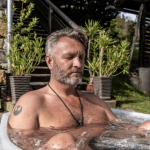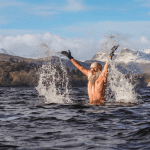
Why winter swimming is not as dangerous as you might think
With some experience, you can control most of the risks of cold water immersion, says Simon Griffiths
As winter approaches, it seems I’ve been forwarded every article published that warns about the dangers of cold water swimming or dismisses its benefits. The Observer, for example, questions whether cold water swimming is a “health miracle or a high-risk pastime?” (concluding that the evidence is inconclusive while the risks are real), iNews headlined with “We are not designed for 100C water: The hidden dangers of cold-water swimming,” while the Times led with “Experts pour cold water on the benefits of wild swimming.” I suppose that as winter swimming becomes more popular, there will inevitably be a backlash.
Looking at winter swimming rationally, it’s hard to disagree that they have a point: the evidence of the benefits of cold water immersion is largely anecdotal while the risks can be very real. Why would you engage in a high-risk activity whose benefits are unproven?
But this is a simplistic analysis that ignores two important points about cold water swimming: people’s subjective experience of the activity and their ability to control risk.
From what I’ve observed, most people who swim in cold water are not being dragged unwillingly into it for the possible boost to their immune system, to lower their risk of diabetes or to lose weight. They do it because they have fun, they connect with nature and other people, and they feel good afterwards. You don’t need any more reason than that. If you get some health benefits from it, that’s a bonus. If not, no worries, unless you’re doing yourself or anyone else harm.
And that’s the bit where risk comes in.
Let’s face it. If any of us were dumped in cold water and abandoned, we would die. Some might survive for longer than others but we would all eventually succumb. But I don’t buy the “we weren’t designed for 10 degree water” argument. We weren’t designed to sit at desks all day or use mobile phones, but we nearly all do it. Winter swimmers voluntarily get into cold water and get out when they’ve had enough. If they’re sensible, the probability that harm will befall them is very low.
The key point about the risks of cold water swimming is that they are nearly all under our own control. It’s a different category of risk to, say, an investment where you don’t know what will happen to the financial markets. We know what will happen to us when we get into cold water. Or, at least, you should make it your business to know if you’re planning on doing it. And there is plenty of good and freely available information out there so there is no excuse not to.
For most of us, cold water is only dangerous if we are not prepared for cold water shock or we stay in too long. To stay safe, enter the water cautiously, keeping your head clear of the water until your breathing is under control, and keep your swims short. Dealing with the other hazards of winter swimming is again mostly a matter of thinking ahead and paying attention.
Unfortunately, it’s impossible to eliminate all risk in any activity and some unknowns always remain. For example, you could have an undetected underlying health condition that manifests itself as a result of the stress of cold water immersion (as it could if, say, you decided to run a marathon). However, the majority of hazards in winter swimming are knowable and avoidable. If you think, observe and plan, cold water needn’t be dangerous. If winter swimming brings you joy and makes you feel good, you don’t need incontrovertible scientific evidence of its benefits to justify doing it. But do learn how to stay safe.








